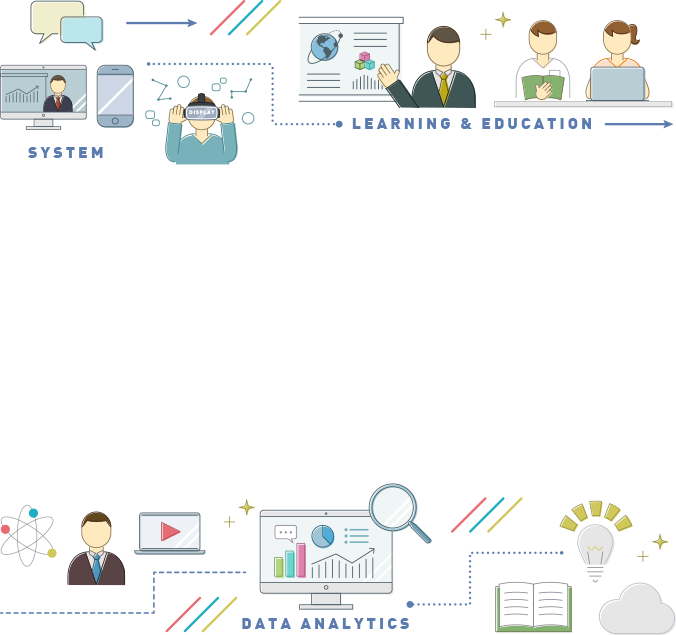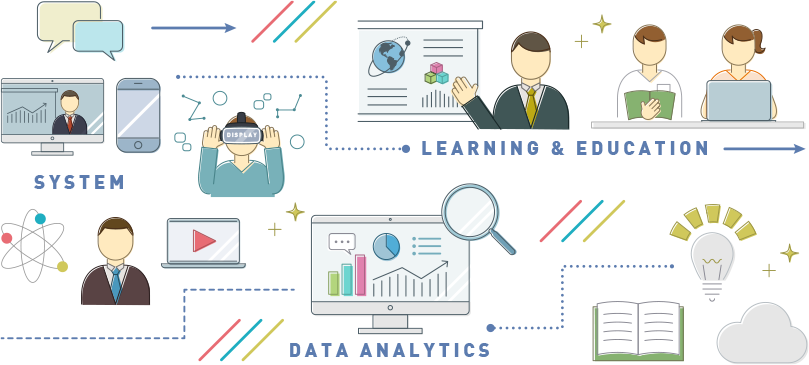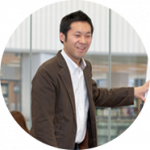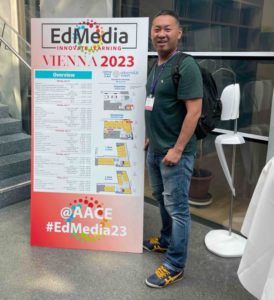
I have made a presentation at ED-MEIDA 2023. Our first author, Mr. Watanabe, is employed and very busy at that time, so I made a presentation instead of him. The title of the presentation is below.
Watanabe, H., Chen, L., Geng, X., Goda, Y., Shimada,A., and Yamada, M. (2023). Does support of learning time management influence learning behaviors and learning performance? Proceedings of ED-MEDIA 2023, in printing
This paper evaluates the academic performance of eight students who used the MAI Helper, a learning analytics-based learning plan development system, compared to other students. The study also assesses whether students using MAI Helper followed the plan they created.
The results shows that higher academic performance of students who took advantage of the system and they had more comments about metacognition in their reflections. If you are interested, please read it.
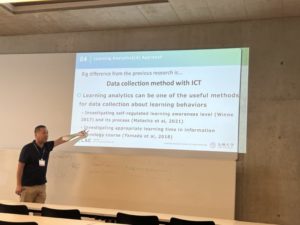
There were also many presentations about Generative AI, perhaps because of its popularity nowadays. Those presentations gave me the impression that the use of humanities and social sciences is still in its infancy. There is a lot of use in things like medicine, dentistry, and science and engineering, where there are answers. In fact, that’s what happened in the review. I guess I don’t have that kind of impression like, “Wow! It’s groundbreaking”.
The topic of Generative AI is endless, but after listening to presentations and various articles, papers, and lectures about it, there are a lot of alright kind of talk… In educational technology, whenever various new technologies have been introduced, there has always been discussion of their pros and cons, effects, and cautions. My impression at the moment is that there is nothing beyond that category. I myself use Generative AI as a “slightly smart thesis search engine. In fact, I have to read the papers myself to see if they are of interest to me or not in many cases. However, I also want to reduce the effort of reading irrelevant papers, so I think this search engine is still on the half way. As for the content of educational use, some studies caught my interest like “I didn’t think of such way to use!”.
However, this does not mean that educational technology is not in the “king of the mountain” mood, and that we do not look at the “lights and darks” of new technology, which I believe educational technology has been carrying on until now. I am not going to ignore the recent news about measuring concentration by pulse, right? I have heard some people say “management education…” in response to the story about measuring something, but I personally think that school boards and schools are more cautious than universities and companies because many of them feel skeptical about new technology. When I talk with school board members and teachers, I am assured that they are more calm, cautious, and polite than universities and companies might think. In fact, I think it is more productive to discuss with various people how we can use this kind of technology to support students. I think it would be a good idea to create a third-party committee and have a forum for formative evaluation of classes on a regular basis. I think that would be a good idea.
However, as a researcher working in the middle of the information and education fields, I feel that the technology is not yet widely used in situations where students are told that they must wear some kind of device to learn. For example, I think that VR/AR and brain waves will be interesting research in the future, but I don’t think it will be easy to spread the technology in class. This is an area where progress in information engineering research is desired, but if users are made to feel some kind of burden, I think there is a high hurdle to broad social implementation. Of course, I think it is very important to have research fields where new technologies are verified. It will help us to see the direction of the project, even to the point of social implementation.
I learned a lot from this international conference. Thank you very much.
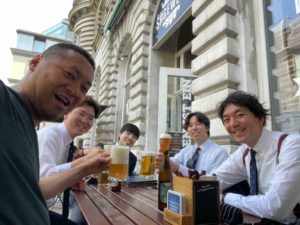
I also met Dr. Watanabe, professor at Tokyo University of Science, for the first time in a while, and after all the sessions of the day were over, I had a drink with the doctoral students of the Watanabe Lab.
We had dinner together the day before returning to Japan and had a heated discussion, recalling our days in the Akabori Laboratory. Dr. Watanabe pointed out to me that there are only a few graduate schools in Japan that train researchers in educational technology, and we are one of them. When he said that, I thought that’s true and we should do it well. We have many Chinese students, but I also think that we need to foster researchers who will stay in Japan and work hard in their research.
It has been a week of much to think about, etc. Thank you very much.
